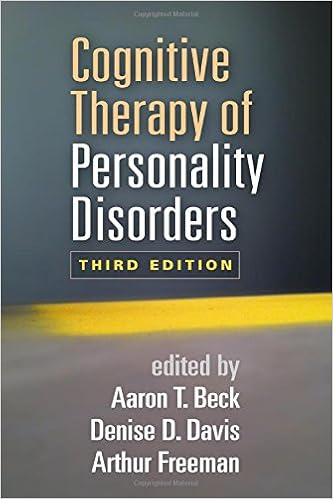
By Aaron T. Beck MD, Denise D. Davis PhD, Arthur Freeman EdD
New to This Edition
*Incorporates state-of-the-art scientific methods and learn; expands the cognitive conception of character disorder.
*Chapters on neural mechanisms, cultural range concerns, and depressive character disorder.
*Chapters on co-occurring problems and administration of scientific challenges.
*Disorder-specific chapters now contain sections on key remedy targets, growth and termination, and clinician self-care.
*Discusses DSM-5 techniques and diagnostic criteria.
*Reviews advances in assessing character beliefs.
Read Online or Download Cognitive Therapy of Personality Disorders, Third Edition PDF
Similar psychiatry books
's Alternative Perspectives on Psychiatric Calidation: DSM, PDF
A number of the present debates approximately validity in psychiatry and psychology are predicated at the unforeseen failure to validate customary diagnostic different types. the popularity of this failure has ended in, what Thomas Kuhn calls, a interval of notable technological know-how during which validation difficulties are given elevated weight, choices are proposed, methodologies are debated, and philosophical and old analyses are noticeable as extra proper than ordinary.
Download e-book for kindle: Why Everyone (Else) Is a Hypocrite: Evolution and the by Robert Kurzban
We're all hypocrites. Why? Hypocrisy is the usual country of the human mind.
Robert Kurzban indicates us that the most important to knowing our behavioral inconsistencies lies in figuring out the mind's layout. The human brain involves many really expert devices designed by way of the method of evolution by way of usual choice. whereas those modules occasionally interact seamlessly, they don't constantly, leading to impossibly contradictory ideals, vacillations among endurance and impulsiveness, violations of our intended ethical ideas, and overinflated perspectives of ourselves.
This modular, evolutionary mental view of the brain undermines deeply held intuitions approximately ourselves, in addition to a variety of clinical theories that require a "self" with constant ideals and personal tastes. Modularity means that there is not any "I. " as a substitute, every one folks is a contentious "we"--a number of discrete yet interacting structures whose consistent conflicts form our interactions with each other and our adventure of the world.
In transparent language, packed with wit and wealthy in examples, Kurzban explains the roots and implications of our inconsistent minds, and why it truly is completely average to think that everybody else is a hypocrite.
Because the book of Miller and Rollnick's vintage Motivational Interviewing, MI has develop into highly renowned as a device for facilitating many alternative types of optimistic habit swap. MI is more and more getting used to assist participants mobilize their strength, dedication, and private assets for addressing quite a lot of psychological well-being matters.
Download PDF by John C. Norcross: History of Psychotherapy: Continuity and Change
Released twenty years in the past, the 1st variation of historical past of Psychotherapy (1992) remains to be thought of the main complete and authoritative source at the topic. development at the good fortune of its predecessor, this new version offers well timed updates to mirror either the continuity and alter in psychotherapy and lines extra thought, examine, perform, and coaching.
- Depressionen verstehen und bewältigen
- Textbook of Men's Mental Health
- Delusions and Other Irrational Beliefs (International Perspectives in Philosophy and Psychiatry)
- Pediatric Psychopharmacology
- There is No Need to Talk about This: Poetic Inquiry from the Art Therapy Studio
- Psychiatry, 2 Volume Set
Extra resources for Cognitive Therapy of Personality Disorders, Third Edition
Example text
By assigning meanings to events, the cognitive structures start a chain reaction culminating in the kinds of overt behavior (strategies) that are attributed to personality traits. Behavioral patterns that we commonly ascribe to personality traits or dispositions (“honest,” “shy,” “outgoing”) consequently represent interpersonal strategies developed from the interaction between innate dispositions and environmental influences. Each strategy has a specific, adaptive goal- oriented function. Attributes such as dependency and autonomy, which are conceptualized in motivational theories of personality as basic drives, may be viewed as a function of a conglomerate of basic schemas.
Each of these interpersonal strategies represents a special sector of the personality, commonly referred to as traits. Each of the strategies (or traits) is tailored to draw on the relevant resources. The strategies are activated in response to the various cravings, urges, and drives and are reinforced by pleasure when the urges are satisfied. On the other hand, failure of a strategy is followed by pain. For example, acceptance by a romantic partner is rewarded by gratification, whereas rejection brings dejection.
It may also be useful to consider the concepts of internalizing and externalizing when observing clinical signs of the various strategies. , impulsive, reactive, hyperactive, aggressive). , avoidant, depressive). , borderline, passive– aggressive). The overlap with grouping by main resources (autonomous or sociotropic) is only partial, and may offer further explanation of differences within those groups. Although this conceptualization remains to be confirmed by research, it may provide a clinically helpful method to recognize patterns, gather further data, communicate with patients, and develop treatment interventions.



